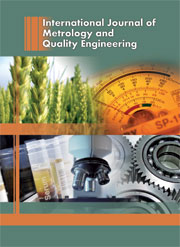Article contents
Relationship between measurement uncertainty and verifiability of geometric specifications: the case study of drilled hole orthogonality
Published online by Cambridge University Press: 05 June 2013
Abstract
In mechanical design, geometrical specifications and dimensional tolerances are commonly used to avoid final product malfunction and to allow for assembly integration. Geometric specification usage, in particular, has many manufacturing and durability implications, the feasibility of their measurement and verification, however, is often neglected and the influence of measurement uncertainty in their evaluation underestimated. Often geometrical specifications are defined without considering measurement uncertainties, or measurability at all: it is not uncommon to find approved specifications prescribing unverifiable geometry, or dimension tolerances that exceed state-of-art measurements. This article explores the case study of orthogonality between a circular hole and the plane on which it is drilled, evaluated using a Coordinate Measuring Machine. Such specification is defined, according to ISO 14253, as the angle between the plane normal and cylinder axis. Uncertainty of points coordinates obtained can, however small, play a key role in the final evaluation of orthogonality: if the specified tolerance is thigh enough it is also possible to have misalignment uncertainty higher than the tolerance itself. The authors propose the results of a mathematical and numerical model, meant to help the designer to define specification to assess the relationship between cylinder-plane misalignment measurability, CMM uncertainty and features dimensions.
- Type
- Research Article
- Information
- International Journal of Metrology and Quality Engineering , Volume 4 , Issue 1 , 2013 , pp. 35 - 39
- Copyright
- © EDP Sciences 2013
References
- 3
- Cited by


